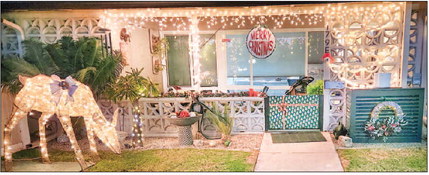Trucks, a tree and amenities fees were topics Feb. 28


GRF BOARD HIGHLIGHTS
by Ruth Osborn
rutho@lwsb.com
The GRF Board of Directors met Feb. 28 to conduct community business and listen to residents’ concerns, which included mini farm development, RV Lot fees and management, and gate access.
At the top of this month’s agenda were a proposal to fund a study to ascertain how much it will cost to build a mini farm and a change in how fees are distributed in the annual budgeting process.
But first came a parade of residents who took the podium to make their voices heard on a variety of issues.
More than five residents encouraged the board to restore the mini farm.
“I think this would be the least costly (amenity) for the area and is the best choice,” said Jeri Dolch, president of Mutual 8, who added that it would “show good will toward the community.”
“There is a huge pent-up demand for it,” agreed Marilyn Kraft of Mutual 15.
Another half dozen speakers criticized rising RV fees. Russell Gray of Mutual 9 called the amenity “a glorified parking lot” and questioned the imposition of a rate hike given that most GRF amenities remain free.
At its Jan. 24 meeting, the board increased the RV fee by $72 in a cost recovery move that is expected to yield about $20,000 annually. Even with the increase, the GRF charges substantially less than nearby RV lots.
As for the mini farm, the board voted to award contracts for $26,650 to Farmscape for design development, and $30,500 to Anacal Engineering Co. for engineering specifications for a possible garden site at the 1.8 Acres.
The work approved in this motion will cost $62,150, and follows expenditures of $46,830 for previous remediation and study efforts.
This latest expenditure will give the board what it needs to assess the scope and cost of the project to see if it is feasible. The board has not officially decided that a garden site will be installed at the 1.8-Acre site.
In other business: Amenity Fee Distribution Change Upon the recommendation of the Finance Committee, the board voted to change the way amenities fees will be distributed during the budgeting process to help bring the $10.2-million reserve fund closer to recommended levels. Pending a 28-day notification to residents, the board amended Policy 40-50612, Fees, to allocate 100% of the amenities fee to the reserve fund. The purpose of the change was to strengthen the reserve fund, which is “signficantly underfunded,” according to an assessment by the GRF analyst.
New GRF members pay an amenities fee upon moving into LW. Heretofore, these fees were equally divided between the GRF reserve fund and the capital improvement fund.
Reserves are used for future repairs and replacement of existing infrastructure and equipment. Capital funding is used to purchase new equipment or finance projects that are neither included in the reserve study nor the current year’s operating budget, according to Policy 40-5340-1.
Director of Finance Mallorie Hall determined that a previous financial decision intended to lessen member assessment increases, combined with the threat of lower unit sales, has decreased the recommended level of funded reserves by about $75,000. That could impact GRF’s capacity to maintain infrastructure, and repair and replace LW’s aging buildings and equipment.
“The motion on the floor totally obliterates capital funds,” said Director Sandy Geffner from Mutual 3, who added that reserves are “68 percent funded. I’ll be voting no.”
Director Susan Hopewell of Mutual 6 took issue with Geffner’s use of the word “obliterate,” pointing out that the capital fund has $1.8 million as of January.
This policy change will increase the amount contributed to reserve funding by more than $1 million annually.
The capital fund’s only source of revenue was from the 50-percent allocation from amenities fees, so the board will need to act to replace this funding source. Unbudgeted projects and new equipment or unforeseen events will have to be covered by capital funds.
For example, the $62,150 cost for the mini farm designs study approved at the meeting was not funded in the 2023 GRF budget and the project was not included in the GAF reserve study so all associated costs must come from the capital fund.
“We have a lot of old equipment, buses, Cushmans, trucks,” Director Carole Damoci of Mutual 12 said. “Reserves took a lot of hits this year. I think this (money) needs to go into reserves.”
The board voted 10-4 to approve the motion.
Holiday Tree Purchase
Upon the recommendation of the Recreation Committee, the board approved $15,800 for the purchase of a holiday tree from Magical Holiay Designs. The price includes installation and storage. The tree will be placed in front of the Health Care Center during the Christmas season.
Robotic Pool Sweep
Upon the recommendation of the Recreation Committee, the board approved the purchase of a robotic pool sweep for the Aquatic Center at a cost not to exceed $5,363.
On-site tests of the device showed it is efficient at cleaning the pool and streamlined the process for staff. Currently, the pool is manually cleaned every morning before it’s opened to residents.
Resales Office Sign
Despite the recommendation of the Architectural Design and Review Committee, the board voted against installing a concrete two-sided sign for the On-Site Sales office at the Leisure World main gate at a cost of about $8,500.
The board supports the idea in concept but voted no because it did not have enough definitive information to make a decision on the purchase. This agenda item will be revisited at the March board meeting and will include a rendering of the sign and where it will be positioned at the Main Gate.
The sign is being installed to call attention and hopefully increase business for the On-Site Home Sales office, GRF’s only official real estate agency. On-Site Home Sales is under the ownership of The Januszka Group, Inc., led by broker Dawn Januszka. In 2021, On-Site Home Sales returned $698,470 to the GRF; in 2022, it returned $610,575. The annual give-back helps offset monthly assessment fees for every LW resident.
Buses, Trucks and Utility Vehicles
Upon the recommendation of the Security, Bus and Traffic Committee, the board approved the purchase of four Minibuses, one of which will be paid for the the Golden Age Foundation. The current buses are more than 30 years old.
A year ago, the board approved the purchase of three Minibuses for about $307,000, but due to supply chain issues, the order had to be canceled. In this most recent attempt to procure buses for LW, the board approved a total of $477,977, which will pay for four buses, one of them from the Golden Age Foundation, which has donated $123,496 to the GRF to cover its cost. Two of the buses will be equipped with ADA lifts.
In a separate action, the board voted to purchase four pickup trucks to replace 1988 Chevys primarily assigned to Service Maintenance that have been deemed potentially unsafe.
The GRF approved the immediate purchase of two Chevy Silverado 2500s and two trucks with Chevy Silverado 1500s that will be outfitted to Service Maintenance specifications for $243,005.20 with a $7,000 contingency.
In a separate action, the board voted to allocate $52,304 plus a $2,000 contingency to buy two Club Car utility vehicles customized to Service Maintenance specifications. The Club Cars will replace Cushman utility vehicles that have been in service for almost 40 years.
The next GRF Board meeting will be held on March 28 at 10 a.m. in Clubhouse 4.




